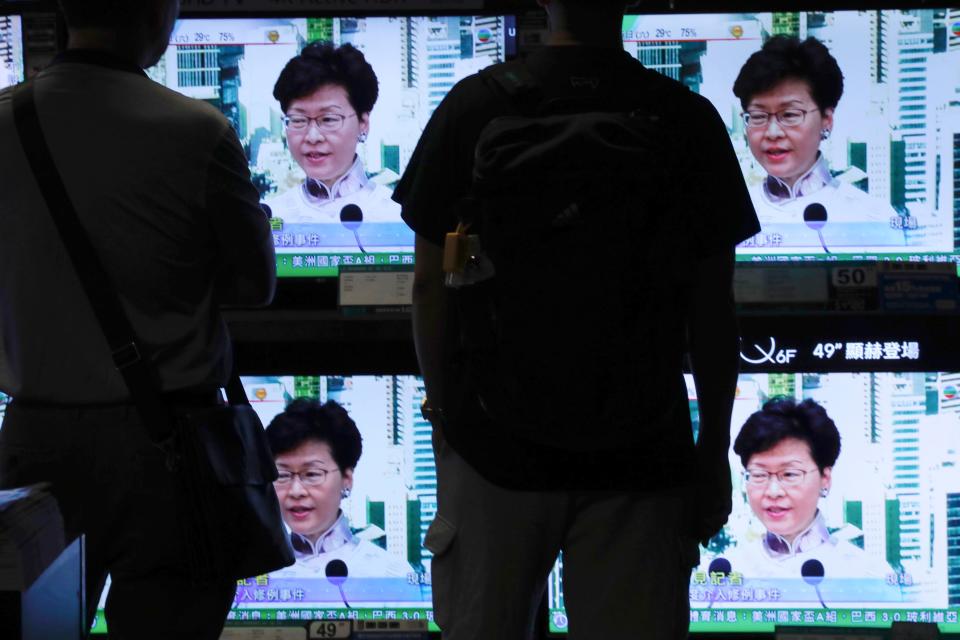What's next for Hong Kong? Controversial extradition bill suspended, not scrapped

After almost a week of massive street protests, Hong Kong's chief executive said Saturday that she has suspended a controversial extradition bill that critics said would undermine the city's unique civil liberties.
But despite the about-face, pro-democracy activists are still vowing another demonstration on Sunday.
"After repeated internal deliberations over the last two days, I now announce that the government has decided to suspend the legislative amendment exercise," Carrie Lam told reporters. "I want to stress that the government is adopting an open mind. We have no intention to set a deadline for this work."
Lam said she would "adopt a sincere and humble attitude in accepting criticism" over the government’s handling of the issue, which had mobilized pro-democracy activists.

After demonstrations last Sunday, protesters surrounded the Legislative Council building on Wednesday, blocking lawmakers from meeting as scheduled to move the legislation toward a vote next week. Organizers said more than a million people had taken to the streets since demonstrators erupted.
Police arrested 11 protesters for illegal assembly, disorderly conduct, and other charges during the demonstrations, according to Hong Kong Police Commissioner Stephen Lo. Police and protesters were injured as police fired batons, tear gas and rubber bullets at demonstrators, who hurled bricks and planks.
After referring to the demonstrators on Wednesday as "spoiled children," Lam struck a more sympathetic tone Saturday, saying "this is the time to restore as quickly as possible calmness in society."
“After the confrontation I saw on Wednesday, if it occurs again there will be more serious (injuries),” Lam said.
The contentious bill has raised concerns among critics that it would be used to undermine the city's civil liberties by making political activists and human rights activists subject to removal.
The former British colony of 7.5 million was formally transferred to in 1997 under an agreement guaranteeing its economic and political system for 50 years.
The extradition bill has drawn criticism from U.S. and British lawmakers and human rights groups, prompting Beijing to lash back with warnings against “interference” in its internal affairs.
What's next for the bill?
Lawmakers had initially been set to vote on the bill this week. But Lam's move, in the short run, takes the issue off the table for now. While suspension is not withdrawal, it could well amount to the same thing if no action is taken. There is little chance for any movement until the fall since the legislature is set to go on summer recess in July.
At minimum, it is a face-saving out for Lam.
Taiwan has helped by withdrawing its extradition request for a murder suspect who had fled to Hong Kong, saying that pressing ahead could endanger Taiwanese citizens.
Without Taipei's request, Lam said, there was "less urgency to pass the bill this year."
How will this affect the protest movement?
Even without the immediate focus on the extradition bill, pro-democracy activists, business groups and other public organizations have clearly been emboldened, further unifying a fractured political opposition.
Sunday's demonstration is still scheduled, says Baggio Leung, an activist and politician who was barred from taking up a seat in the legislature over a protest gesture, The Guardian reports.
But he adds that the government may be trying to use the lull to "defuse the movement."
Hong Kong, the newspaper says, was rife with reports of the widespread arrest of activists, including many taken out of hospitals where they were being treated after the street clashes.
He said the movement would continue until the extradition law was permanently taken off the table but expressed concern about the chilling effect of mass prosecutions.
What is Beijing's likely reaction to the upheaval?
Aside from warning foreign governments not to interfere in China's internal affairs, Beijing has keep a low profile as the events unfolded. It appeared China preferred to let the tensions subside rather than force a confrontation.
Officially, the Chinese foreign ministry said in a statement that the Chinese Central Government expresses its "support, respect and understanding" for Hong Kong authorities and will maintain its "staunch support for Lam" during the unrest.
Sing Tao, the pro-Beijing newspaper, noted that Lam made her decision after meeting Friday night with Han Zheng, a vice-premier, politburo member and the central government’s point man on Hong Kong.
The newspaper said Lam, after "measuring various factors, decided to postpone further action on the bill so that the government has enough time to re-advise and explain more to the public."
This article originally appeared on USA TODAY: What's next for Hong Kong? Controversial extradition bill suspended, not scrapped

